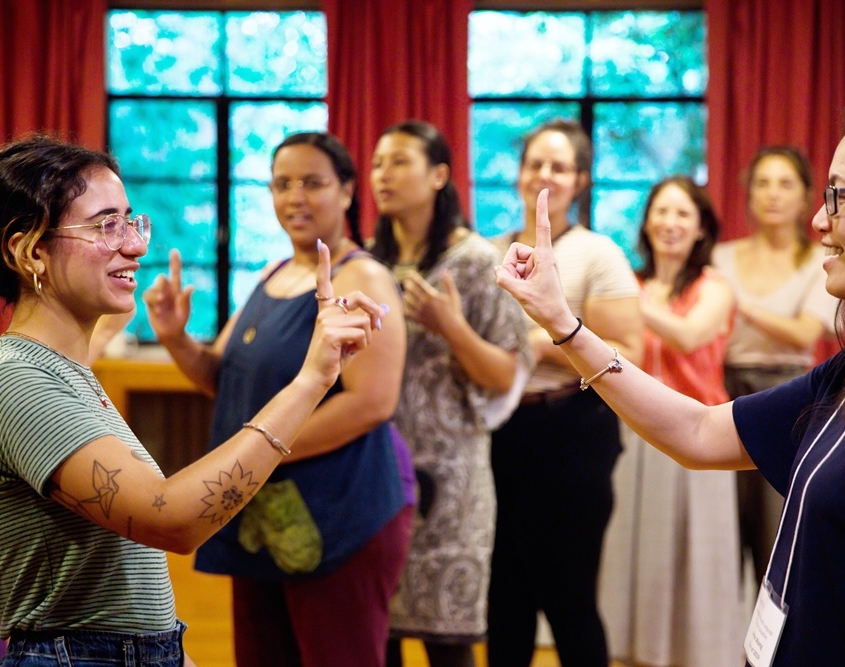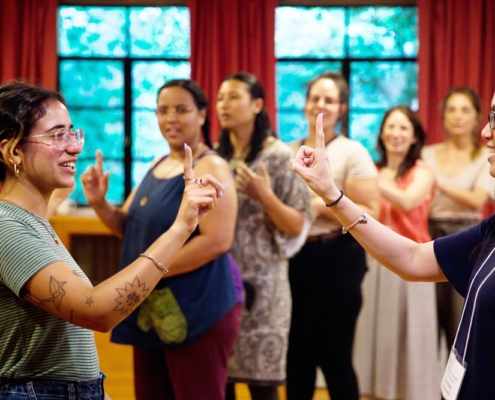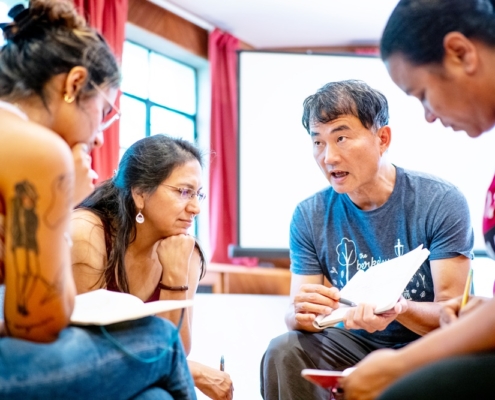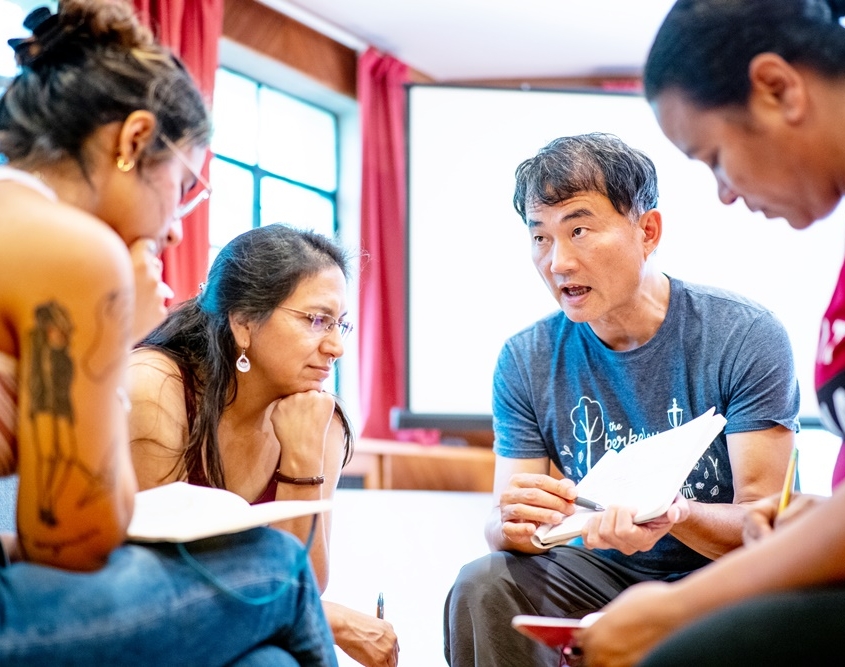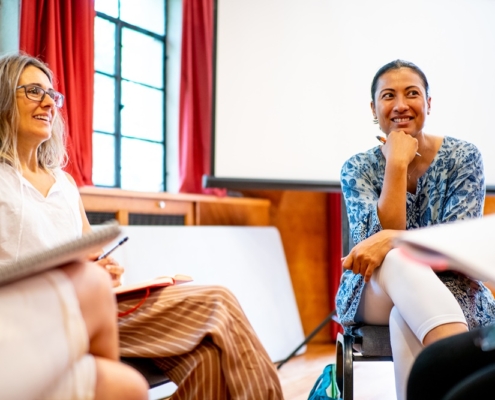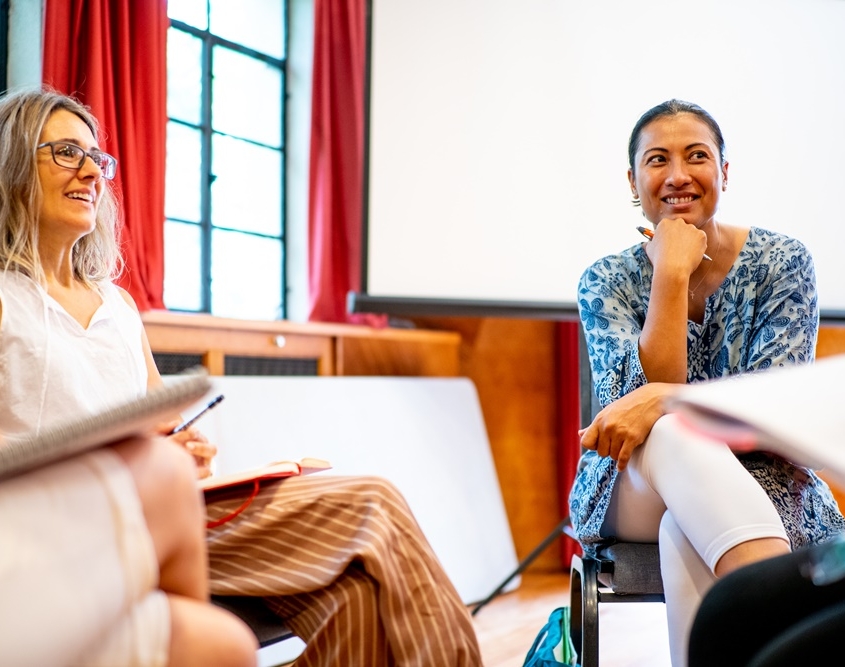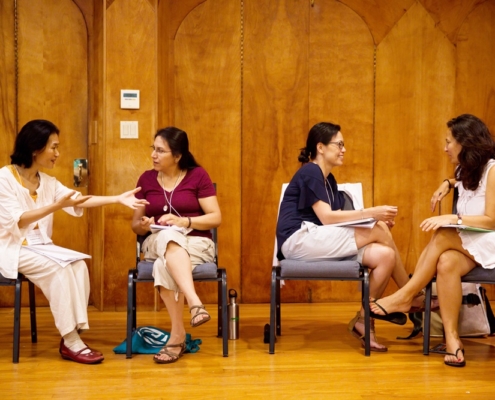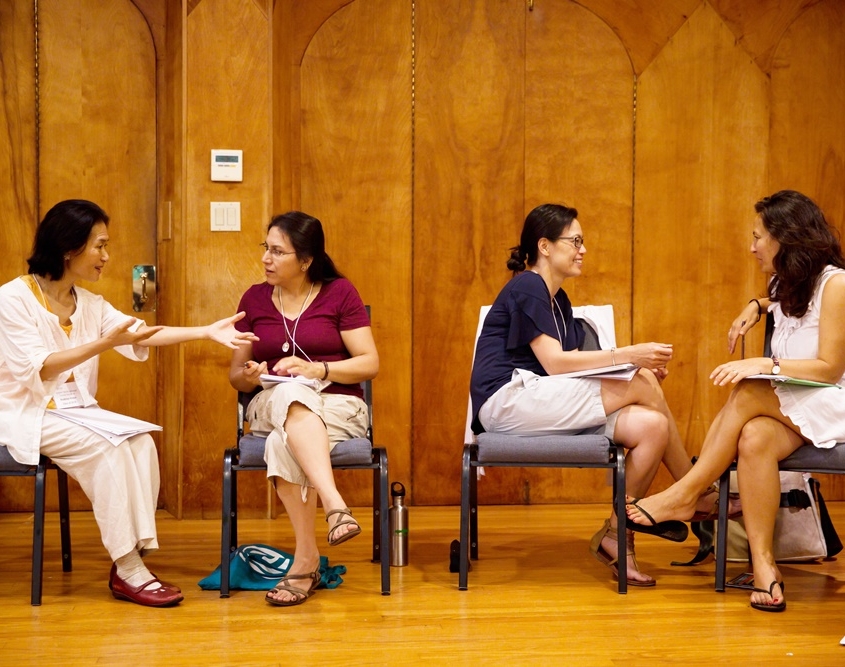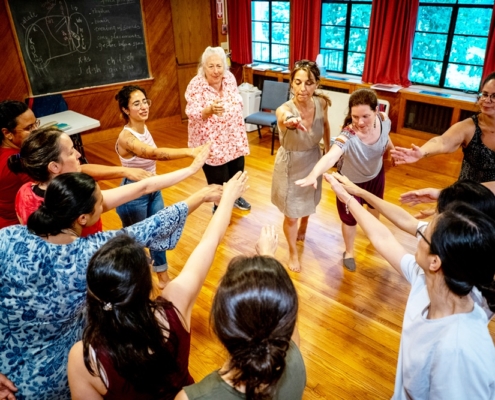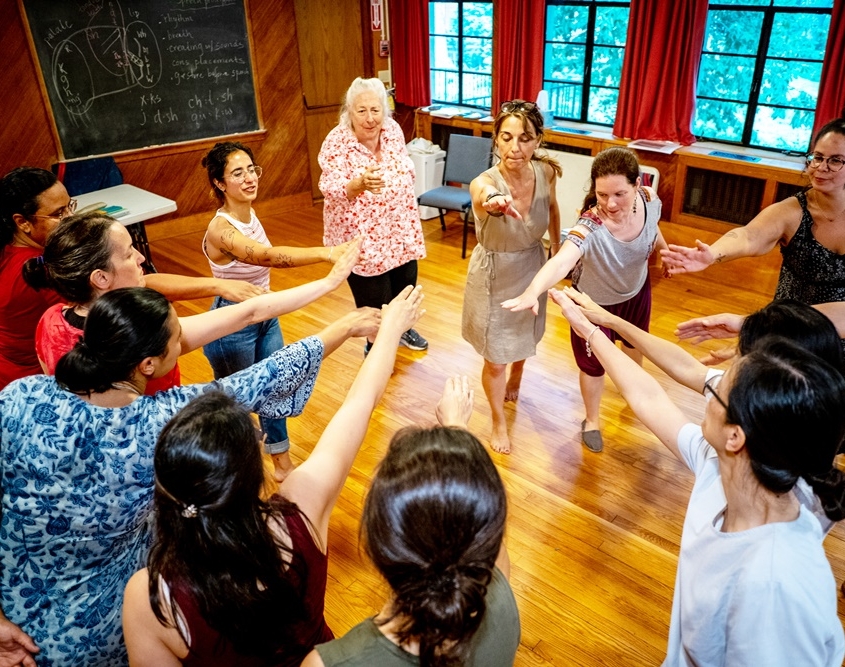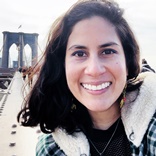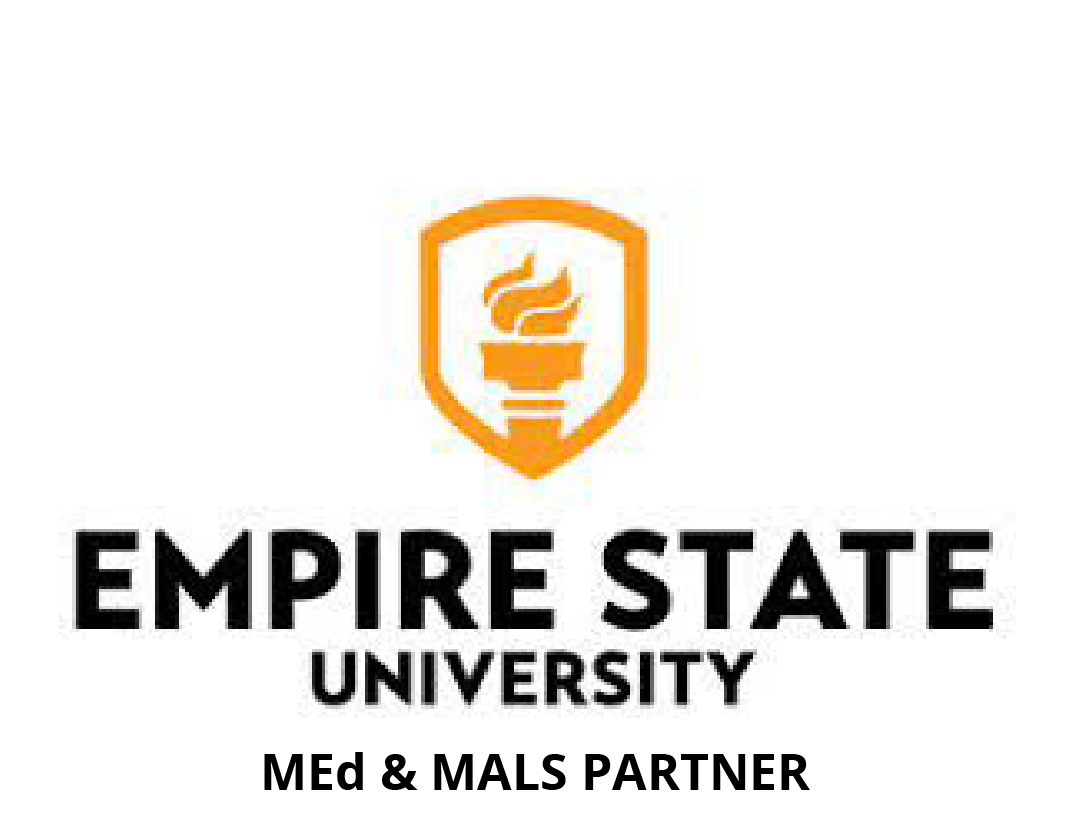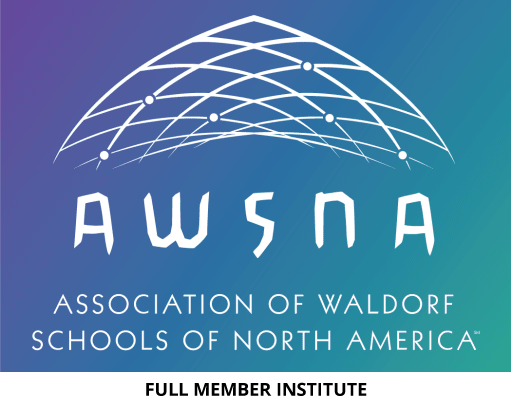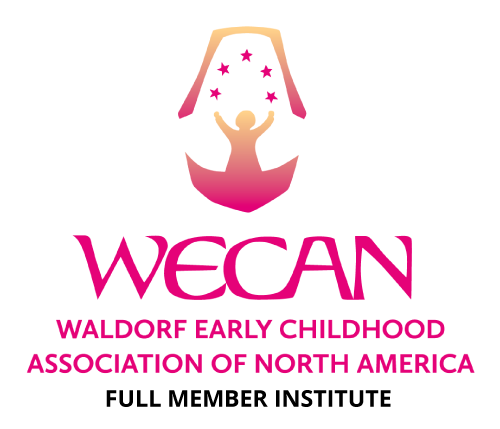Sunbridge’s three-week Waldorf World Languages & Cultures Teacher Education certificate program is designed for current or aspiring grades 1-8 Waldorf world language teachers. This offering is designed to provide these teachers with an informed understanding of Waldorf curriculum and an anthroposophical view of child development, enabling these individuals to be more fully integrated members of their school community and to meet their students through the lens of a Waldorf educator.
This program is offered every other year and next enrolls July 2026.
World Languages Coordinator: Constanza Ontaneda
Academic Experience
As a world languages student, the focus of your three-week on-campus study will be on the theoretical considerations and practical aspects of world language teaching through the grades. There is additional daily coursework in child development, Waldorf pedagogy, and the arts. Reading fundamental texts by Rudolf Steiner and instruction in developing a meditative practice is included in the experience, as is a one-week observation of an experienced Waldorf world language teacher that takes place during the following school year.
In some courses you will be studying alongside students from Sunbridge’s three-year Elementary Teacher Education diploma program, most of whom are practicing Waldorf teachers. This academic environment provides you with the benefit of developing colleagueship among fellow Waldorf educators. Through your studies, you will gain a Waldorf pedagogical understanding of the child and a knowledge of how that understanding relates to world language study. This will lead to a deepening of the curriculum for both you as a world language teacher and the Waldorf class and other subject teachers with whom you work, allowing for a more informed partnership.
Program Goals
- Students will learn how to teach world languages in accordance with Waldorf education.
- In addition to large group instruction in teaching world languages in general, students will be given opportunities to work in small groups with same-language colleagues, developing and sharing ideas concerning curricular themes, celebrating festivals, and practical activities.
- Students will understand the anthroposophical basis for learning new languages and why learning and acquiring a new language is so important to child development.
- Students will learn how to address the challenge world language teachers face in the classroom, including time management, classroom management, curriculum development, and lesson planning.
- Increasingly, a school’s world language teachers are called upon as ambassadors and conduits to world cultures. In this offering, participants will explore some of the gifts and challenges involved in meeting the needs of their communities, including cultural appreciation vs appropriation, creating inclusive and authentic festivals, and supporting colleagues, parents, and students in their school experiences.
“It is hard to say what was most significant. I have pages and pages of notes and many many essential and enlightening lessons. I particularly appreciated the wonderful collaboration with my classmates.”
“I (now) understand the development of the child and how it should affect our teaching. I feel much better prepared for the school year and am very happy that I came!”
~ Sunbridge World Language Teacher Education students
Components
Length
The world language offering is comprised of a three-week on-campus summer study, plus a one-week observation of an experienced Waldorf world language teacher.
Observation
The required one-week observation of an experienced Waldorf world language teacher will be arranged for a mutually-convenient time and setting during the academic year that follows. Observations must be completed by June of that academic year.
Curriculum
151A-F Teaching World Language (45 hours)
103A, B, or C Child Development and Learning (23 hours)
110C Inner Development (13 hours)
133A Speech I (7 hours)
137 Eurythmy (15 hours)
138 Chorus and Recorder (15 hours)
140 Observation (32 hours)
Total hours: 150
Curriculum subject to change
Students are asked to bring curriculum ideas (verses, songs, games) to share and discuss.
Combine with Elementary Program
Sunbridge world language students may elect to combine their specialized world language studies with matriculation in our Elementary Teacher Education program and receive a Waldorf teacher education diploma with concentration in world language teaching. Matriculation in our elementary program entails meeting certain admission requirements, such as having earned 60 credits from an accredited college or university, and paying full program tuition. Elementary program graduates are eligible to apply their Sunbridge studies toward earning a fully-accredited SUNY master’s degree with a concentration in Waldorf education. If you would like to learn more, please contact our admissions office at [email protected] / 845-425-0055 x20.
Coordinator & Lead Faculty
Constanza Ontaneda is a 2015 graduate of our World Languages program and a native Spanish speaker who was born in India and grew up in Perú, Brazil, Romania and the US. Constanza has formally studied eight languages, including French, German, Russian, and Mandarin, and has taught Spanish, French and English to adults, as well as to high school, middle school, and elementary school students, for over a decade. She was a 1st—8th grade Spanish teacher for four years at Brooklyn Waldorf School where her mentor was Sunbridge’s previous World Languages coordinator, Yolanda Navarro, and chaired the world language department at a middle school in Times Square. Currently, she dedicates herself full time to Input Wand, a publishing house with the mission to provide materials to educators and learners world-wide so they can nurture a research-based, proficiency-oriented, and input-focused practice.
Constanza holds a BS in Fiber Science & Apparel Design from Cornell University, an MA in Latin American & Caribbean Studies from New York University and an MA in Creative Writing & Publishing from Western Colorado University. Her passion lies at the intersection of acquisition-driven Instruction, social emotional learning, and DEI best practices, and she is dedicated to helping make the language classroom both a healing and learning environment. She is very excited about providing a robust, comprehensive, interactive World Languages program to Sunbridge students, and we are very happy to welcome her back to our Institute.
Please see our faculty page for bios of our elementary program faculty under whom our world language students also study.
Tuition & Financial Aid
Tuition for the Summer 2024 cohort. Financial aid is available for qualifying students.
Discount policy: A 10% discount will be applied to the school’s and the students’ contribution when there are two or more enrollments from one school during one academic year.
Admission Requirements
This program is designed for those currently teaching world languages in Waldorf schools or those who aspire to become Waldorf world language teachers. Applicants must be proficient in the language they currently or intend to teach. A high school diploma is required for admission; a bachelor’s degree is not required.
Applicants must complete an application form and submit all required application materials, including a letter of reference from someone qualified to speak to your suitability for the vocation of Waldorf world language teacher and your ability to be successful in this intensive. Applicants must possess a high school diploma (a bachelor’s degree is not required). Financial aid is available. Students receive a certificate upon completion.
Application Process
Applicants are encouraged to apply as early as possible, especially those individuals seeking financial aid.
A completed application includes:
- Complete application form
- Current résumé
- One letter of recommendation (accompanied, if required, by a signed letter-of-recommendation form) sent from your recommender directly to the Sunbridge Institute Admissions Office
- If applicable, a transcript from your degree-granting institution, or any college attended. Otherwise, a high school transcript or diploma.
- Non-refundable $50 application fee. Applications received without this fee will not be processed
Send all materials to:
Sunbridge Institute Office of Admissions
285 Hungry Hollow Road
Chestnut Ridge, NY 10977
Once your application is received, we review it for completeness and contact you to arrange a phone interview. Admissions decisions are sent out soon thereafter, on a rolling basis.
All applicants whose first language is not English or who have taken their prior education in a non-English-speaking college or university must demonstrate oral and written proficiency in English during the admissions process. Taking the Test of English as a Foreign Language (TOEFL) or the International English Language Testing System (IELTS) may be required.
The online application for the July 2026 cohort will be available here October 1, 2025. Contact [email protected] for assistance with our application form.
For Assistance
Contact our admissions office at [email protected] / 845-425-0055 x20
Non-Discrimination Statement
In all of its dealings, including its admissions, educational, and employment practices, it is the policy of Sunbridge Institute, its Trustees, officers, employees and other duly authorized agents not to discriminate against any individual or group for reasons of race, color, creed, gender, age, culture, ethnicity, national origin, marital status, sexual orientation or identification, or mental or physical disability.
Sunbridge Institute reserves the right to cancel or change any offering at any time and to make faculty or course substitutions when necessary.


